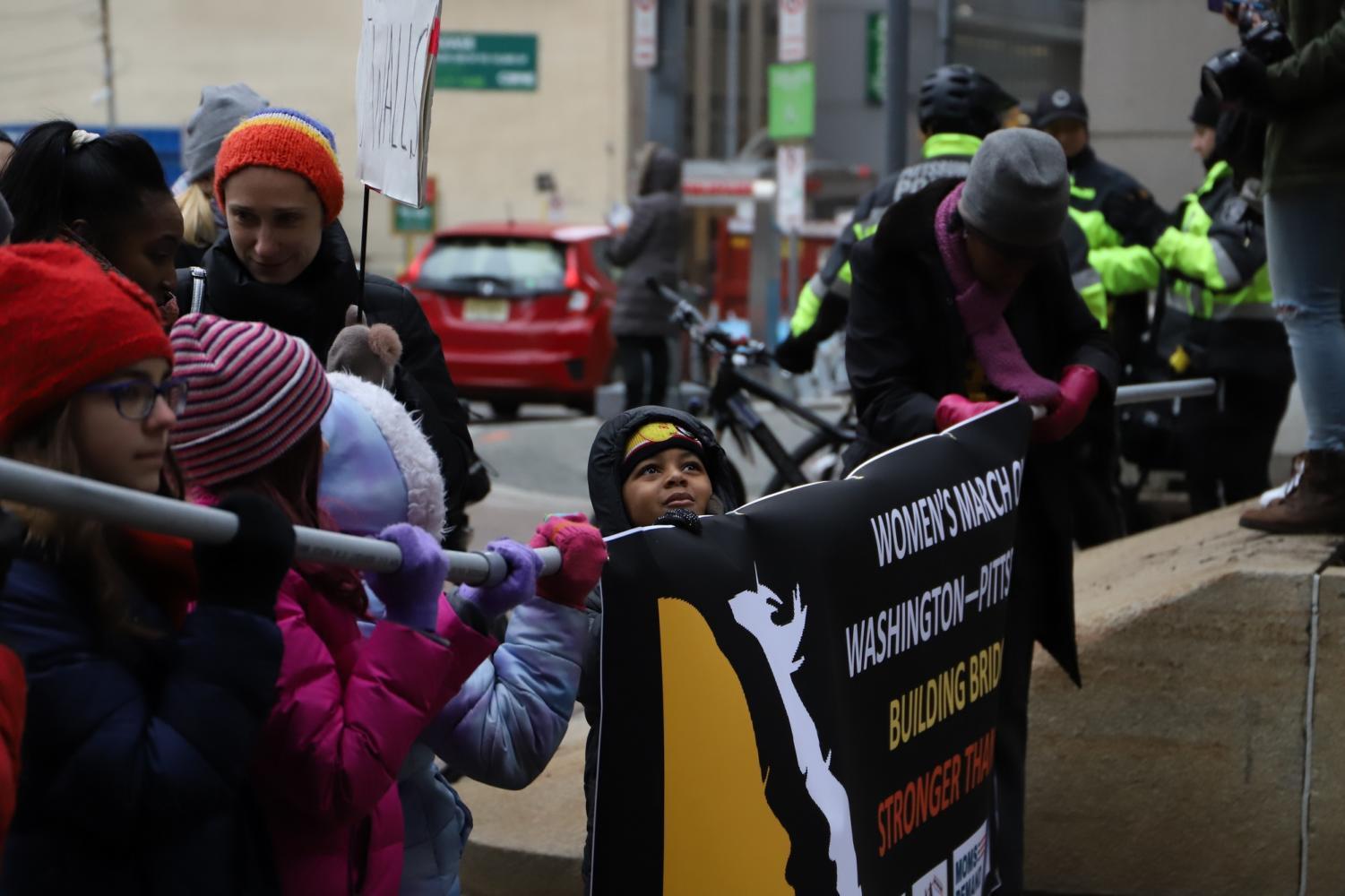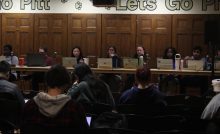Pittsburgh hosts third annual Women’s March


The theme of this year's march is "Building Bridges: Stronger than Hate."
On a freezing January morning in downtown Pittsburgh, 10-year-old Sofia Rinaldo from Shadyside stood amid a dense, enthusiastic crowd of marchers underneath the arches of the City Council Building. She was there for the same reason as many others.
“I hope I make a difference,” Rinaldo said.
The third annual Pittsburgh Women’s March on Saturday didn’t command a crowd like last year’s, which drew an estimated 30,000 marchers, but an estimated 1,000 still showed up with the same goal as Rinaldo. The marchers wore pink hats, carried baby Donald Trump balloons and held colorful signs with a variety of political slogans.
Many politicians, including several candidates for local office this year, attended the march.
Rep. Conor Lamb, D-Pa., said he chose to attend the march to support the women who helped him in his campaigns.
“I’m here to honor the people who helped me get elected. When you look out there, you see the foot soldiers of my two campaigns last year,” Lamb said. “They were the women in suburbs organizing on their own and knocking on doors on cold days like today.”
Allegheny County Executive Rich Fitzgerald said those efforts paid off when Democrats flipped the U.S. House of Representatives in November.
“Last year, [Democrats] flipped more than 40 seats in the United States Congress — Connor Lamb flipped two seats,” Fitzgerald said to applause from the crowd. “We elected more women, including the first two African-American women in suburban districts in Allegheny county.”
One marcher took a jab at President Donald Trump with a sign that read “IKEA has a better cabinet.” Others carried posters pushing progressive causes, like equal pay, reproductive rights and more diversity in government.
[Read: Pittsburgh prepares for “Stronger Than Hate” Women’s March]
Steve Angus, a 66-year-old from West End, said marches like this remind people of what really matters.
“‘Our lives begin to end the day we become silent about things that matter,’” Angus said, quoting Martin Luther King Jr. “I’ve always been a feminist. I think it’s good for those of us with like minds to get together to encourage one another and to remember what we’re here for.”
According to organizers, creating solidarity between different identities was the main goal of this year’s march. Its theme, “Building Bridges: Stronger Than Hate,” echoed the slogan that appeared in Pittsburgh after the Tree of Life shooting, and was intended to encourage Pittsburghers to bridge the divide between all identities.
The national Women’s March, which took place Saturday in Washington, D.C., faced accusations of anti-Semitism and prioritizing straight, cisgender white women’s issues over those plaguing the LGBTQ+ community and people of color.
Fitzgerald acknowledged the allegations in a speech, saying such discrimination has “no place in this march or in this community.”
“It’s unfortunate that in Washington, D.C., there are people taking part in that march who aren’t exactly strong against anti-Semitism,” Fitzgerald said. “I will tell you that here in Pittsburgh, we reject anti-Semitism, and we stand in solidarity with our Jewish brothers and sisters.”
Head organizer Tracy Baton said anti-Semitism and anti-LGBTQ+ discrimination have never been issues with the Pittsburgh march.
“We have had people, coincidentally, who have worshipped in Tree of Life on every organizing committee,” she said. “As far as any concerns about us not being representative of the LGBTQ+ community, I identify publicly as queer. And we have always had members of the LGBTQ+ community who have been part of our action.”
Protesters display their signs.
For many protestors at the march, the cause was personal. Baton herself draws inspiration from her mother and grandmother, who both worked in activism.
“I can remember going with my grandmother to a white woman’s house to discuss political things and having to go in the back door,” Baton said. “The world has substantially changed. I don’t live in that world, and it was because of her work that I don’t.”
First-year Pitt student Maya Albanowski called her brand of feminism “intersectional,” and said she tries to stand up for all marginalized communities — not just women.
“I think it’s important to stand up to injustice when you hear it. Whether it’s someone making a rape joke or racist joke in one of your classes or in your residence hall,” Albanowski said. “Regular people can stand up to that, and it helps.”
Julian Taylor, a 29-year-old military veteran running for Beaver County Commissioner, found inspiration in his daughter.
“I want my daughter to understand that I’ll always have her back by marching,” Taylor said.
Recent Posts
Pitt men’s basketball navigating transfer portal difficulties
Pitt men’s basketball is like any other team in the world of large NIL deals…
Column | Pirates shouldn’t rush David Bednar back to Pittsburgh
David Bednar’s career arc has taken a turn for the worse over the last 12…
Photos: Pitt Small Jazz Ensemble
Pitt Small Jazz Ensemble performed in the Bellefield Hall Auditorium on Tuesday, April 15. [gallery…
Photos: Pitt Volleyball vs Ohio State
Pitt Volleyball defeats Ohio State University 3-0 at the Fitzgerald Field House on Saturday April…
SGB addresses concerns about ICE presence on campus, hears SJP lawsuit against administration, approves governing code bill
At its weekly meeting on Tuesday at Nordy’s Place, Student Government Board heard concerns about…
ACLU of Pennsylvania sues Pitt over SJP suspension
The ACLU of Pennsylvania filed a federal civil lawsuit against the University of Pittsburgh and…

